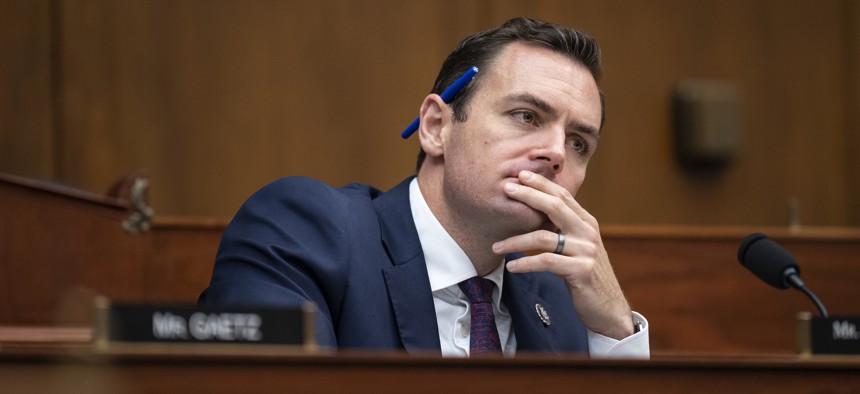House bill looks to shore up federal cyber workforce

Rep. Mike Gallagher, R-Wis., chairs a hearing of a congressional subcommittee in July 2023. Gallagher is a sponsor of bipartisan legislation that would authorize the federal government to launch programs to support the development of the cybersecurity workforce. Drew Angerer/Getty Images
The bill, a companion to a Senate bill introduced in July, looks to fortify the U.S.’s domestic cybersecurity workforce and training programs.
House lawmakers introduced legislation to support veterans and service members looking to launch public sector cybersecurity careers.
The Federal Cybersecurity Workforce Expansion Act, introduced in the lower chamber by Reps. Mike Gallagher, R-Wis, and Chrissy Houlahan, D-Pa, would establish two new programs designed to grow the federal cybersecurity workforce: a cybersecurity apprenticeship program housed at the Cybersecurity and Infrastructure Security Agency and a pilot program at the Department of Veterans Affairs that offers cybersecurity training to veterans.
A companion measure was introduced by Sens. Maggie Hassan, D-N.H., and John Cornyn, R-Texas, in July. Similar legislation was offered in past years, but failed to pass Congress. But sponsors hope that the combination of the growing cyber threat and the continued shortage of qualified cybersecurity workers will help build support for the measures.
“There is a crippling shortage of cybersecurity workers that is leaving private companies and the federal government increasingly vulnerable to cyber threats,” Gallagher said in a statement. “By creating programs that provide veterans with the skills they need to help protect this country in the cyber domain, this bill is an innovative way to bolster our nation’s cyber defenses and strengthen the federal cyber workforce while giving veterans an opportunity to continue serving their country.”
Other provisions within the bill echo the Biden administration’s domestic tech policies, like partnering with private sector entities to expand job opportunities for beneficiaries of the training programs.
The bill also looks to partner with local, state, and tribal communities and governments to further help veterans find cybersecurity training and job opportunities. It also adds expanded definitions to what qualifies as a cybersecurity education and training provider to include high school, community college, and Job Corps centers along with traditional college or post-collegiate programs.






